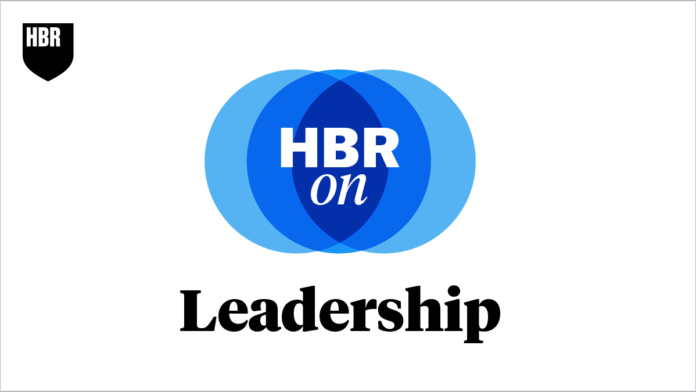HANNAH BATES: Welcome to HBR on Leadership, case studies and conversations with the world’s top business and management experts, hand-selected to help you unlock the best in those around you.
Is being the most knowledgeable and experienced person on your team always a good thing?
Sydney Finkelstein points out that expertise can lead you astray in two crucial ways. It can hinder your curiosity about new developments and make you overly confident in your problem-solving abilities.
Finkelstein, a professor at Dartmouth’s Tuck School of Business and an expert in leadership and talent development, offers leaders a different approach : fostering humility and open-mindedness. He provides research-based advice to guide you in this direction.
This episode originally aired on HBR IdeaCast in April 2019. Here it is.
ALISON BEARD: Welcome to the HBR IdeaCast from Harvard Business Review. I’m Alison Beard.
People work hard for years, even decades, to become experts in their fields. There is a sense that once you reach that level, you are set. You are at the top of your game and can navigate most work situations effortlessly. However, our guest today suggests that there are significant downsides to expertise.
Finkelstein has researched numerous managers who excel in their fields—CEOs, generals, chefs, coaches—and has identified what he calls the “expertise trap.”
Due to their vast knowledge, some individuals become closed off to alternate perspectives or develop excessive confidence in areas outside of their expertise. Their knowledge and experience actually impede their continued success.
Fear not, as there are ways to avoid this trap, and Sydney is here to discuss the issue and its solutions with us. He is a professor at Tuck’s School of Business at Dartmouth College and the author of the HBR article, “Don’t Be Blinded by Your Expertise.” Sydney, thank you for joining us.
SYDNEY FINKELSTEIN: Great to be with you Alison.
ALISON BEARD: So, what exactly defines an expert in your opinion?
SYDNEY FINKELSTEIN: Experts come from various walks of life. My focus mainly revolves around organizational leaders of all kinds. An expert is someone with a proven track record, who has mastered a body of knowledge, received recognition for their success, and not necessarily restricted to top executives. It could be the best coder, the top market researcher, or anyone highly skilled in their respective fields.
ALISON BEARD: We often view expertise as a significant asset in the workplace. What are some key ways in which it can be detrimental in decision-making?
SYDNEY FINKELSTEIN: Like many things in life, expertise has both positive and negative aspects. While experience holds value, it can sometimes lead to incorrect interpretation of lessons learned from the past. Additionally, individuals with deep expertise tend to continuously strive for improvement in a particular area, which may result in neglecting broader factors that are becoming crucial for success.
The risk lies in dedicating all efforts to mastering one specific skill, only to find out that another skill has become more essential, eventually leading to a loss of competitive advantage.
ALISON BEARD: Is there a risk of going on autopilot due to expertise, where you have identified the most efficient methods and no longer question the process? How can one balance efficiency with openness to new approaches?
SYDNEY FINKELSTEIN: Many managers and executives face this dilemma. It often depends on their career stage and the pace of change in their industry. While expertise may bring short-term success, the evolving landscape demands continuous self-reinvention. It’s crucial to consider scenarios where your expertise might lose significance and explore alternative strategies accordingly.
Constantly challenging underlying assumptions, seeking diverse viewpoints, and fostering curiosity are essential steps to break free from the expertise trap.
ALISON BEARD: How can one recognize the signs of falling into the expertise trap? What are some ways to cultivate a more curious perspective?
SYDNEY FINKELSTEIN: Self-awareness is key in identifying potential pitfalls. Seeking feedback from diverse sources, evaluating current business strategies, and anticipating shifts in industry trends can help in staying ahead. Engaging in exercises that question core assumptions, such as exploring what might happen if those assumptions were incorrect, can also foster open-mindedness and curiosity.
Emphasizing creativity, critical thinking, and pattern recognition skills are crucial for leaders to transcend their expertise and navigate complex problems effectively.
ALISON BEARD: Could you share examples of leaders who have managed to steer clear of the expertise trap? What sets them apart?
SYDNEY FINKELSTEIN: Several CEOs have successfully avoided the expertise trap through unconventional approaches. For instance, Aron Ain, CEO of Kronos, conducts impromptu focus groups to engage with employees at all levels and genuinely listens to their feedback. David Solomon from Goldman Sachs pursues DJing as a hobby, exposing himself to new perspectives and experiences.
Chris Van Gorder, CEO of Scripps Health, gathers a diverse group of friends for candid feedback, challenging his assumptions and fostering continuous learning. These leaders demonstrate the value of humility, curiosity, and openness to new ideas in evading the expertise trap.
ALISON BEARD: Thank you, Sydney, for sharing your insights with us.
SYDNEY FINKELSTEIN: Pleasure speaking with you, Alison.
HANNAH BATES: That was Sydney Finkelstein in conversation with Alison Beard on HBR IdeaCast. He’s a professor at Dartmouth’s Tuck School of Business and an expert in leadership and talent development.
Join us next Wednesday for another enlightening conversation about leadership from the Harvard Business Review. If you found this episode valuable, share it with your network and tune in to our show on Apple Podcasts, Spotify, or your preferred platform. Leave us a review and access more insightful content from top business and management experts at HBR.org.
This episode was produced by Mary Dooe, Ramsey Khabbaz, Anne Saini, and myself, Hannah Bates. Ian Fox served as our editor. Music by Coma Media. Special thanks to Maureen Hoch, Erica Truxler, Nicole Smith, Anne Bartholomew, and our dedicated listeners. See you next week.




